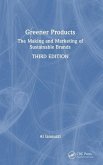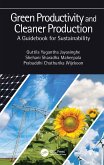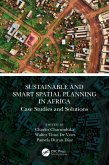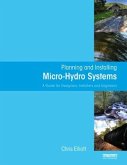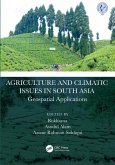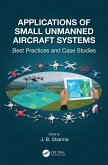- Gebundenes Buch
- Merkliste
- Auf die Merkliste
- Bewerten Bewerten
- Teilen
- Produkt teilen
- Produkterinnerung
- Produkterinnerung
Oil palm cultivation is known to be one of the leading causes of deforestation and degradation of the environment. This book introduces and explains the application of geospatial technology to an established and important tropical agricultural industry for responsible and sustainable management.
Andere Kunden interessierten sich auch für
![Greener Products Greener Products]() Al IannuzziGreener Products171,99 €
Al IannuzziGreener Products171,99 €![Green Productivity and Cleaner Production Green Productivity and Cleaner Production]() Guttila Yugantha JayasingheGreen Productivity and Cleaner Production127,99 €
Guttila Yugantha JayasingheGreen Productivity and Cleaner Production127,99 €![Sustainable and Smart Spatial Planning in Africa Sustainable and Smart Spatial Planning in Africa]() Sustainable and Smart Spatial Planning in Africa154,99 €
Sustainable and Smart Spatial Planning in Africa154,99 €![Green Manufacturing and Materials Processing Methods Green Manufacturing and Materials Processing Methods]() Green Manufacturing and Materials Processing Methods194,99 €
Green Manufacturing and Materials Processing Methods194,99 €![Planning and Installing Micro-Hydro Systems Planning and Installing Micro-Hydro Systems]() Chris ElliottPlanning and Installing Micro-Hydro Systems299,99 €
Chris ElliottPlanning and Installing Micro-Hydro Systems299,99 €![Agriculture and Climatic Issues in South Asia Agriculture and Climatic Issues in South Asia]() Agriculture and Climatic Issues in South Asia176,99 €
Agriculture and Climatic Issues in South Asia176,99 €![Applications of Small Unmanned Aircraft Systems Applications of Small Unmanned Aircraft Systems]() Applications of Small Unmanned Aircraft Systems176,99 €
Applications of Small Unmanned Aircraft Systems176,99 €-
-
-
Oil palm cultivation is known to be one of the leading causes of deforestation and degradation of the environment. This book introduces and explains the application of geospatial technology to an established and important tropical agricultural industry for responsible and sustainable management.
Hinweis: Dieser Artikel kann nur an eine deutsche Lieferadresse ausgeliefert werden.
Hinweis: Dieser Artikel kann nur an eine deutsche Lieferadresse ausgeliefert werden.
Produktdetails
- Produktdetails
- Verlag: CRC Press
- Seitenzahl: 282
- Erscheinungstermin: 15. Mai 2024
- Englisch
- Abmessung: 234mm x 156mm x 18mm
- Gewicht: 599g
- ISBN-13: 9780367190095
- ISBN-10: 0367190095
- Artikelnr.: 70141193
- Herstellerkennzeichnung
- Libri GmbH
- Europaallee 1
- 36244 Bad Hersfeld
- gpsr@libri.de
- Verlag: CRC Press
- Seitenzahl: 282
- Erscheinungstermin: 15. Mai 2024
- Englisch
- Abmessung: 234mm x 156mm x 18mm
- Gewicht: 599g
- ISBN-13: 9780367190095
- ISBN-10: 0367190095
- Artikelnr.: 70141193
- Herstellerkennzeichnung
- Libri GmbH
- Europaallee 1
- 36244 Bad Hersfeld
- gpsr@libri.de
Dr. Kasturi Devi Kanniah is a professor at the Department of Geoinformation, faculty of Built Environment and Surveying, Universiti Teknologi Malaysia (UTM). Her academic journey is marked by an unwavering commitment to environmental sustainability. As a member of the Centre for Environmental Sustainability and Water Security at UTM and a valued member of the TropicalMap research group within the Sustainability Research Alliance, Dr. Kanniah's research primarily focuses on bridging field data with remote sensing technology. This synergy provides invaluable insights into large-scale changes in land use and land cover, as well as the intricate dynamics of vegetation processes. Her research extends across both rural and urban environments, shedding light on their pivotal role in the pursuit of low carbon cities and the mitigation of atmospheric pollution. She is recognised as a fellow member of the Malaysia Academy of Sciences and a senior member of the Institute of Electrical and Electronic Engineers (IEEE), reflecting her exceptional standing in the academic and scientific circles. Beyond her research portfolio, Dr. Kanniah serves as the Associate Editor of the International Journal of Remote Sensing (IJRS) and holds an Editorial Board position at the International Journal of Geoinformatics (IJG). She has also curated special issues for IJG, IJRS, and Remote Sensing. Throughout her illustrious career, Dr. Kanniah has earned numerous national and international awards for her exceptional research and publications, further solidifying her position as a top-tier scientist in the world. Her awards include recognition as one of the world's top 2% scientists in 2021, 2022 and 2023. In recognition of her outstanding contributions, Dr. Kanniah was a Global Scholar Programme awardee at the Institute for Social Sciences Research, University of Dundee, UK, and a visiting researcher at Tsinghua University, China, in 2022. Dr. Le Yu is an Associate Professor at the Department of Earth System Science, Tsinghua University. His research has been on the use of geographical information techniques to monitor and model global land use change, especially cropland and to facilitate many applications, e.g., food security, biodiversity conservation, and land system modelling. He particularly focuses on satellite-based methods to quantify the spatiotemporal change of land cover/use and understand their ecological, environmental, and socioeconomic impacts on sustainable development. He is Scientific Steering Committee (SSC) member of the Global Land Programme (GLP), Fellow of the Royal Geographical Society (RGS-IBG), Fellow of the Higher Education Academy, Senior Member of the Institute of Electrical and Electronics Engineers, and Prominent Visiting Researcher at the University of Technology Malaysia (UTM). He is currently Editor-in-Chief of Geo: Geography and Environment, Section Editor-in-Chief of LAND, Associate Editor of International Journal of Remote Sensing, and editorial board member of Global Sustainability and Geoscientific Model Development.
1. Oil Plam as a Commercial Crop 2. Remote Sensing 3. Geographical
Information System 4. Geomatics 5. Mapping Oil Palm Land Use 6. Oil Plam
Tree Detection 7. Age Classification of Oil Palm Trees 8. Topographic
Mapping 9. Productivity and Yield Forecasting of Oil Palm 10. Oil Palm Pest
and Disease Detection 11. Climate Suitability for Oil Palm Expansion 12.
Carbon Cycle in Oil Palm Planation 13. Sustainability 14. Envrionmental
Sustainability 15. Oil Palm and Social Sustainability 16. Sustainable Palm
Oil 17. Future Outlook
Information System 4. Geomatics 5. Mapping Oil Palm Land Use 6. Oil Plam
Tree Detection 7. Age Classification of Oil Palm Trees 8. Topographic
Mapping 9. Productivity and Yield Forecasting of Oil Palm 10. Oil Palm Pest
and Disease Detection 11. Climate Suitability for Oil Palm Expansion 12.
Carbon Cycle in Oil Palm Planation 13. Sustainability 14. Envrionmental
Sustainability 15. Oil Palm and Social Sustainability 16. Sustainable Palm
Oil 17. Future Outlook
1. Oil Plam as a Commercial Crop 2. Remote Sensing 3. Geographical
Information System 4. Geomatics 5. Mapping Oil Palm Land Use 6. Oil Plam
Tree Detection 7. Age Classification of Oil Palm Trees 8. Topographic
Mapping 9. Productivity and Yield Forecasting of Oil Palm 10. Oil Palm Pest
and Disease Detection 11. Climate Suitability for Oil Palm Expansion 12.
Carbon Cycle in Oil Palm Planation 13. Sustainability 14. Envrionmental
Sustainability 15. Oil Palm and Social Sustainability 16. Sustainable Palm
Oil 17. Future Outlook
Information System 4. Geomatics 5. Mapping Oil Palm Land Use 6. Oil Plam
Tree Detection 7. Age Classification of Oil Palm Trees 8. Topographic
Mapping 9. Productivity and Yield Forecasting of Oil Palm 10. Oil Palm Pest
and Disease Detection 11. Climate Suitability for Oil Palm Expansion 12.
Carbon Cycle in Oil Palm Planation 13. Sustainability 14. Envrionmental
Sustainability 15. Oil Palm and Social Sustainability 16. Sustainable Palm
Oil 17. Future Outlook


